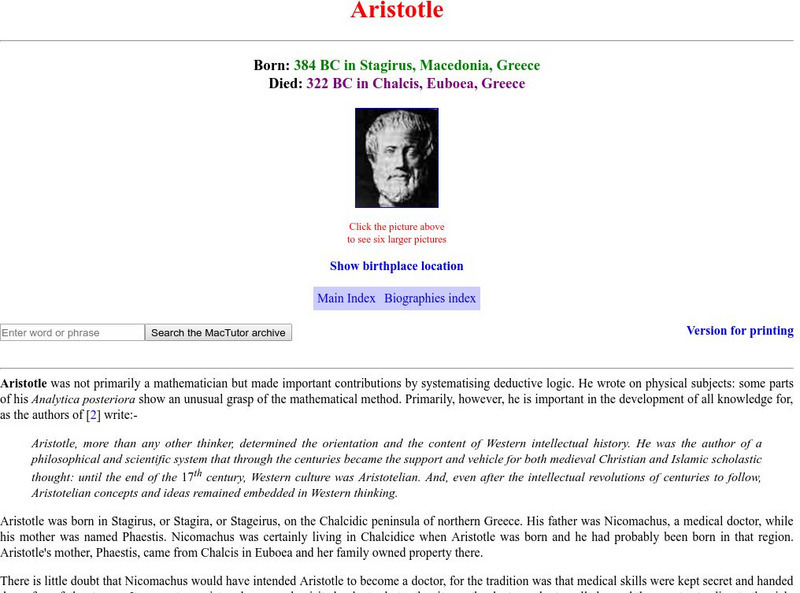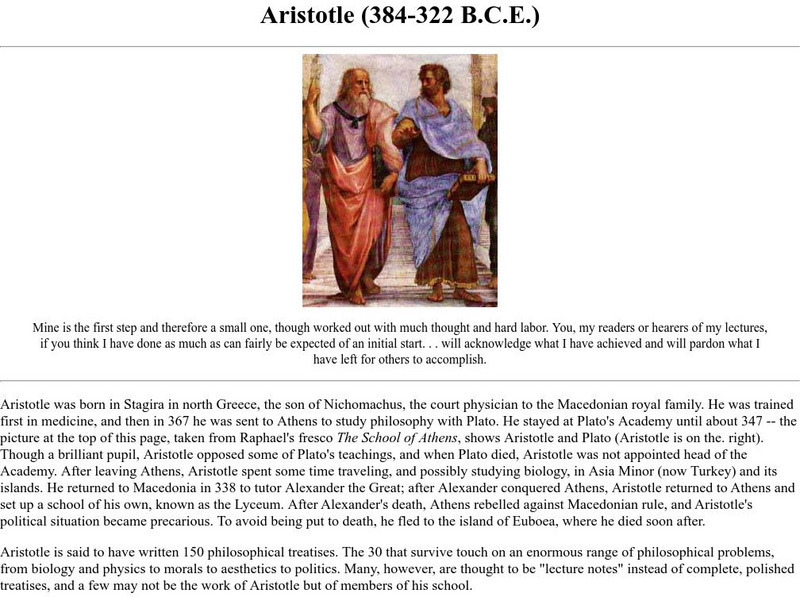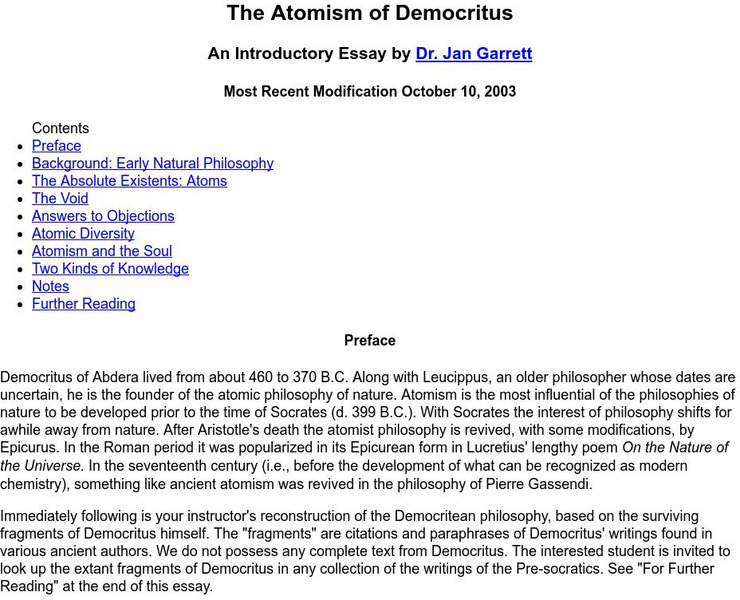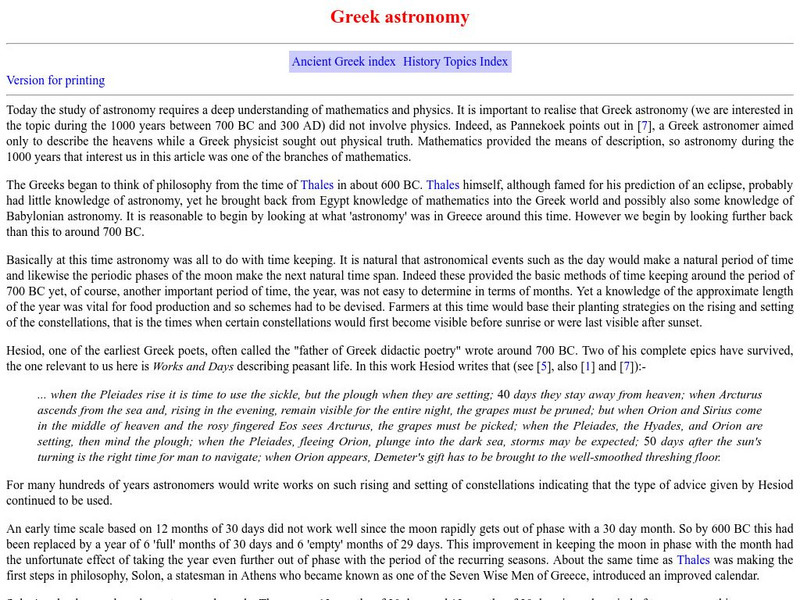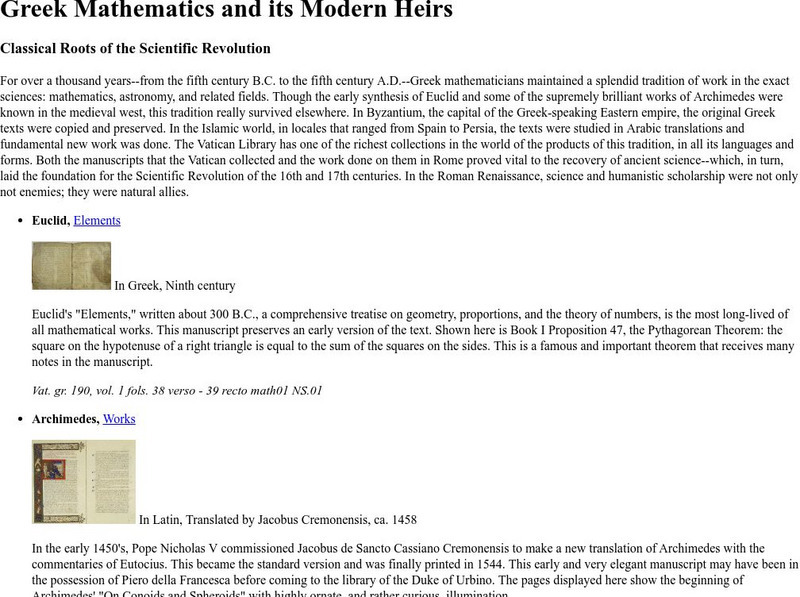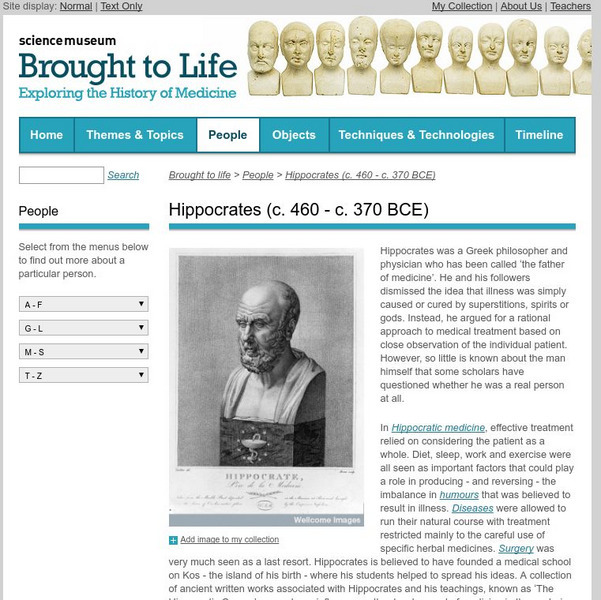Hi, what do you want to do?
University of Oregon
University of Oregon: Greek Science: Early Cosmology
Discusses the evolution of ideas about the cosmos, from the Magic Cosmology of the Neolithic age to the stage of Mythical Cosmology, to the Geometric Cosmology of the ancient Greeks. The third stage advocated a rational approach to...
Other
History World: Greek Science Timeline
A timeline of scientific discoveries and theories of the ancient Greeks. It covers the period from 585 BC to 150 AD, with three additional entries for related events in the 1900s. Each entry has links to additional content on the website...
University of St. Andrews (UK)
University of St. Andrews: Aristotle
An excellent look into the life of the ancient Greek intellectual thinker, Aristotle. This article details Aristotle's childhood and travels as well as his various theories.
Stanford University
Stanford Encyclopedia of Philosophy: Anaxagoras
Discusses the life of Anaxagoras of Clazomenae, his ideas about the metaphysical, the physical, the cosmos, and human intelligence, and the impact he had on later intellectuals. He is especially remembered for having been the first to...
Stanford University
Stanford Encyclopedia of Philosophy: Aristotle
Looks at the life of Aristotle (384-322 B.C.E.) and the far-reaching scope of his intellectual ideas. The article examines in depth his theories in the disciplines of philosophy, politics, mathematics and science, and his legacy.
Stanford University
Stanford Encyclopedia of Philosophy: Democritus
A look at the life of Democritus of Abdera. He helped to develop a theory of atomism, explained in detail here. Other significant ideas he had included his theory of perception, a theory of the soul and its relationship to living things,...
Other
Museum of Ancient Greek Technology
This is a virtual exhibition of inventions from ancient Greece that have been reconstructed by Kostas Kotsanas after over two decades of study and research. Click on 'The Museum' link at the top of the page to read an explanation and to...
Internet Encyclopedia of Philosophy
Internet Encyclopedia of Philosophy: Aristotle: Biology
Looks at the life of Aristotle and his work in the field of biology. His different theories are explained, and the ideas he got right as well as some he got wrong.
University of California
Ucmp: Aristotle
The life and philosophical treatises of Aristotle (384-322 BCE) are surveyed, including his writings on biology, zoology and physics.
Other
Western Kentucky University: The Atomism of Democritus
An essay explaining the atomist beliefs of the philosopher Democritus.
Other
Explorable: Ancient Astronomy, Science and the Ancient Greeks
Discusses the influences of other cultures on ancient Greek astronomers, and the advances made by the Greeks. It highlights major astronomers and those who contributed important ideas from the 6th to the 2nd centuries BC, including...
Other
History World: History of Greek Science
Presents the history of Greek science from the 6th century BC to the 2nd century AD. Navigate using the menu on the left. Covers major figures in science and mathematics, their theories and beliefs, and the influence they had, as well as...
Smithsonian Institution
National Air and Space Museum: Exploring the Planets: Ancient Times & the Greeks
In ancient times only five planets were known: Mercury, Venus, Mars, Jupiter, and Saturn. Learn about Greek astronomer Ptolemy's theory for the solar system that was to survive for fourteen centuries.
Famous Scientists
Famous Scientists: Aristotle
A detailed biography of Aristotle (384-322 BC). Discusses his early life, his education, his relationship with Alexander the Great as tutor, the breadth of his work in various science disciplines, the school he established in Athens, and...
Other
Edward Worth Library: Theophrastus of Eresus
Theophrastus is believed to have lived from 371 BC to 287 BC. This entry describes his work in the field of botany.
World History Encyclopedia
World History Encyclopedia: Greek Astronomy
Looks at the history of Greek astronomy from the 4th century BC on, and the major figures who contributed ideas. Includes a timeline of Greek science.
World History Encyclopedia
World History Encyclopedia: Greek Science
Looks at the history of Greek science from the 7th century on, and the major figures who contributed ideas. Includes a timeline of Greek science.
University of St. Andrews (UK)
University of St. Andrews: Greek Astronomy
Provides an overview of ancient Greek astronomy and the major figures who played a role in developing ideas about the Universe.
University of Virginia
University of Virginia: How the Greeks Used Geometry to Understand the Stars
An article explaining how the Greeks were able to use their science and mathematics to predict where astronomical objects such as the Planets could be found in the nighttime sky even though their underlying premise was that the earth did...
Other
The Basics of Philosophy: Aristotle
A discussion of Aristotle's life and work, including his writings, his system of logical reasoning, and his contributions to different fields, such as politics, philosophy, and science.
Other
Ancient History: 10 Ancient Greek Inventions and Discoveries Still Used Today
Ten of the important inventions and innovations of the ancient Greeks are described. These include the water mill, the odometer, alarm clocks, cartography, the Olympics, geometry, Hippocratic medicine, philosophy, democracy, and...
ibiblio
Ibiblio: Greek Mathematics and Its Modern Heirs
This ibiblio.org site discusses the "Classical roots of the scientific revolution," with concentration on the Greek mathematicians from the 5th century BC to the 5th century AD who "Maintained a splendid tradition of work in the exact...
Other
Ancient Greek Philosophy: Democritus of Abdera
A discussion of the theories of Democritus (c. 460-370 BC). He is best known as an atomist, having developed an atomic theory. Also discusses the ideas of other philosophers who are believed to have influenced Democritus.
Science Museum, London
Science Museum: Brought to Life: Hippocrates (C. 460 C. 370 Bce)
A brief overview of Hippocrates and his ideas about effective medicine.







